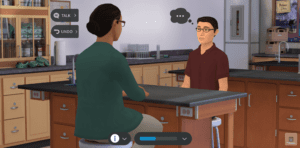Professional development to help educators support LGBTQ+ students
Pride Month is an opportunity to learn, grow, and develop a deeper understanding of how to support members of LGBTQ+ communities.
Schools must strive to create safe spaces for all students to learn, develop, and grow. Spaces where they can show up authentically and connect with others.
According to the Center for Disease Control and Prevention, more than 10% of high school students identify as lesbian, gay, bisexual, or unsure; these students face much higher rates of bullying, feelings of hopelessness, suicidal thoughts and attempts, and absence from school due to feeling unsafe. That’s why we created Step In, Speak Up!, an interactive role-play simulation for educators that builds their capacity for understanding and supporting LGBTQ+ students.
“This program [Step In, Speak Up!] expresses our passion to improve the lives of our learners. It asks us to be selfless in our openness to be allies for one another. It evokes courage to act quickly and do the right thing. It invites us to be inclusive and to consider other perspectives. It shows us the benefit of embracing change. And it implores us to be accountable to protecting young people.” – Jennifer Spiegler, Senior Vice President of Strategic Partnerships
About the interactive learning experience, Step In, Speak Up!
Step In, Speak Up! is an interactive role-play simulation for middle and high school educators that builds understanding and appreciation for the challenges faced by LGBTQ+ youth, and prepares users to lead real-life conversations with students to curtail harassment and support those who may be struggling as a result of bullying or isolation.

After completing the 30-minute simulation, learners will:
- Understand the definitions of the LGBTQ+ acronym, the challenges faced by LGBTQ+ students, and the importance of creating an inclusive and supportive academic environment for LGBTQ+ students
- Learn to respond when someone makes a biased comment or express prejudice towards LGBTQ+ students
- Learn to respond supportively when a student comes out as LGBTQ+
- Identify warning signs of distress, including verbal, behavioral, and situational clues
- Connect students who may be in distress with campus support services
- Understand the school’s available resources to support LGBTQ+ students
Step In, Speak Up! is a solution for schools, districts, and state agencies seeking to rapidly and cost-effectively build capacity and drive sustainable change to improve school climate and safety.
Role-play conversations give educators valuable practice
In the Step In, Speak Up! simulation, educators meet three virtual high school students who share their experiences of bullying and harassment.

Learners go through a series of interactive scenarios where they have an opportunity to practice leading conversations to address bullying and the use of biased language in the classroom.
By practicing making a one-on-one connection with a virtual student who has been a target of harassment, educators can gain confidence to help them put their skills to use in real life when they identify a student who needs support.
Read: 7 Advantages of Learning with Virtual Humans
The practice scenarios include: 1) curtailing instances of bullying and use of homophobic language in the classroom, and 2) connecting one-on-one with a student who has been a target of harassment. This course is listed in the SPRC/AFSP Best Practices Registry and is offered in collaboration with The Trevor Project and Campus Pride.
Created by experts and thought leaders
Step In, Speak Up! was first built in 2012 with funding and input from the Arizona Department of Behavioral Health Services and subject matter expertise from The Trevor Project, a nonprofit organization founded in 1998 focused on suicide prevention efforts among LGTBQ+ youth. It was later updated to expand the information about trans youth with additional expertise from Mental Health America of Northern California and other external subject matter expert partners.
Evidence-based and research-backed
Step In, Speak Up! has been accepted for review by SAMHSA’s National Registry of Evidence-based Programs and Practices (NREPP). An empirical study showed statistically significant increases, when compared to the control group, on user skills and likelihood to effectively address bullying behavior.
A longitudinal study with over 1,250 teachers and staff found that:
- 75% of participants agreed or strongly agreed that there was an increase in the number of conversations they had with other adults in their school community regarding how to better support LGBTQ students
- 99% would rate the simulation as good, very good, or excellent
- 95% would recommend the simulation to a colleague
- 99% think that all staff in their school should take the simulation
- 99% said it was based on scenarios relevant to their work with students
There have been peer-reviewed studies demonstrating the effectiveness of Step In, Speak Up!
Jennifer, who uses the pronouns she/her/hers, said her favorite article of all is a piece written by transgender activist Tyler Ford that speaks to the joy of being recognized and affirmed even in a virtual world. Tyler writes, “Step In, Speak Up! makes me feel seen, cared for, respected, and appreciated. That a simulation like this exists feels like a miracle to me, because LGBTQ+ youth are struggling every day both in school and in their home lives and need all of the support we can offer.”
“Step In, Speak Up! makes me feel seen, cared for, respected, and appreciated. That a simulation like this exists feels like a miracle to me, because LGBTQ+ youth are struggling every day both in school and in their home lives and need all of the support we can offer.” – Tyler Ford, trans activist
“Every time I read Tyler’s words — and, truly, the whole piece is worth a read — I literally tear up,” Jennifer said. “The Kognito team made this, and it has the power to change lives.”
Read Tyler’s full article on them.us.
Experience the power of role-play conversations with virtual humans
If you’re interested in bringing this powerful simulation to your school or district, take a demo to experience the impact of role-play conversations with virtual humans.